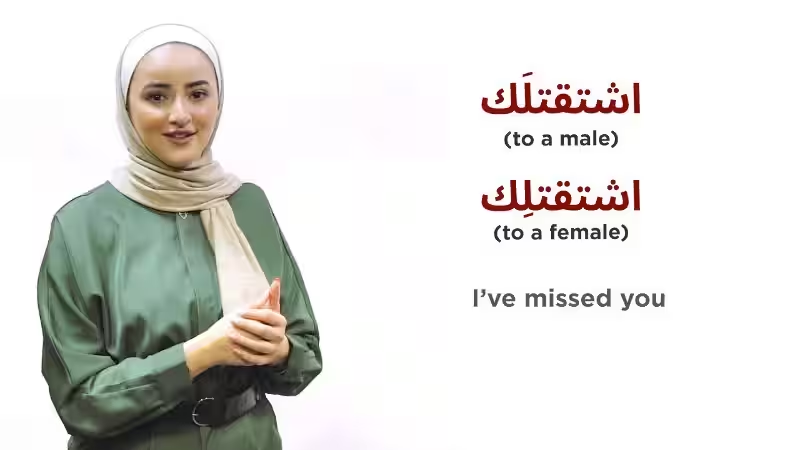
In the tapestry of human emotions, longing for a loved one’s presence is a universal thread. And while the English phrase “I miss you” conveys this feeling succinctly, the richness of the Arabic language offers a variety of ways to express this sentiment, each carrying its own nuanced meaning. This guide will explore the diverse ways to say “I miss you” in Arabic, helping you navigate the delicate art of expressing longing and affection in this beautiful language.
The Classic Expression: “أشتاق إليك/إليكِ” (ashtaq ilaik/ilaiki)
The most common and widely recognized way to say “I miss you” in Arabic is “أشتاق إليك/إليكِ” (ashtaq ilaik/ilaiki). This phrase literally translates to “I long for you.” The choice between “إليك” (ilaik) and “إليكِ” (ilaiki) depends on the gender of the recipient. “إليك” is used for a male recipient, while “إليكِ” is used for a female recipient.
This phrase is versatile and can be used in various contexts, from casual conversations with friends to heartfelt expressions of love to a partner. Its simplicity and directness make it a reliable choice for conveying deep longing and affection.
Beyond the Classic: Exploring Other Expressions of “I Miss You”
While “أشتاق إليك/إليكِ” (ashtaq ilaik/ilaiki) is the most common way to say “I miss you,” the Arabic language offers a beautiful array of alternatives, each carrying a unique shade of meaning. Let’s delve into some of these options:
“أفتقدك/أفتقدكِ” (aftaqiduka/aftaqiduka) – A More Direct Expression
The phrase “أفتقدك/أفتقدكِ” (aftaqiduka/aftaqiduka) directly translates to “I miss you.” This expression carries a slightly different connotation than “أشتاق إليك/إليكِ” (ashtaq ilaik/ilaiki). While both convey longing, “أفتقدك/أفتقدكِ” (aftaqiduka/aftaqiduka) emphasizes the absence of the person and the feeling of being incomplete without them. It’s a phrase that speaks to the tangible, everyday moments you miss when someone is not around.
“أودّ لو أنّك هنا” (awadd law annaka huna) – A Wish for Their Presence
If you want to express your desire for someone to be with you, the phrase “أودّ لو أنّك هنا” (awadd law annaka huna) is a beautiful way to do so. This phrase translates to “I wish you were here.” It speaks to the longing for the person’s presence in the current moment. It’s a heartfelt expression that highlights the emptiness you feel without them by your side.
“أشتاق لوجودك/وجودكِ بجانبي” (ashtaq liwujoodika/wujoodiki bijanbi) – Expressing Longing for Their Presence
This phrase, “أشتاق لوجودك/وجودكِ بجانبي” (ashtaq liwujoodika/wujoodiki bijanbi), translates to “I miss having you by my side.” This expression emphasizes the longing for the person’s presence and the value you place on their companionship. It speaks to the joy and comfort you find in being with them and the emptiness you feel without their presence.
Understanding the Nuances and Context
The choice of phrase to express “I miss you” in Arabic goes beyond mere translation. It involves understanding the subtle nuances of each expression and considering the context of your message. Here are some factors to keep in mind:
The Level of Formality:
The level of formality in your message will influence your choice of phrase. For instance, “أشتاق إليك/إليكِ” (ashtaq ilaik/ilaiki) is a versatile phrase that can be used in both formal and informal contexts. However, phrases like “أفتقدك/أفتقدكِ” (aftaqiduka/aftaqiduka) might be more appropriate for casual settings, while expressions like “أودّ لو أنّك هنا” (awadd law annaka huna) might be better suited for more formal occasions.
The Nature of Your Relationship:
The nature of your relationship with the recipient will also influence your choice of words. For a romantic partner, you might use phrases like “حبيبي” (habibi – my love) or “حبيبتي” (habibti – my love) to add a touch of affection to your message. With family members, you might opt for more familial terms like “أخي” (akhi – my brother) or “أختي” (akhti – my sister).
The Specific Situation:
The specific situation will also influence your choice of words. If you’re expressing your longing for a loved one who has passed away, you might choose a more poetic or emotionally charged phrase. If you’re simply missing a friend who’s away on a trip, you might use a more casual and playful expression.
Beyond Words: Adding Depth and Sentiment
While a single phrase can convey the sentiment of “I miss you,” the beauty of the Arabic language allows you to express this emotion with added depth and sentiment. Here are some ways to enhance your message:
Using Affectionate Terms:
Adding affectionate terms like “حبيبي” (habibi – my love) or “حبيبتي” (habibti – my love) can add a touch of warmth and intimacy to your message. These terms are commonly used for romantic partners, but can also be used for close friends or family members.
Incorporating Poetry:
Arabic poetry is rich in expressions of love and longing. Incorporating a verse or two of poetry into your message can add a layer of beauty and depth. For example, you could use a line from a famous love poem by Khalil Gibran or another poet known for their heartfelt expressions of longing.
Adding Personal Touches:
Personalizing your message can make it more meaningful. You can reference a shared memory, a inside joke, or something specific that you miss about the person. These small touches can make your message feel more intimate and heartfelt.
Pronunciation and Usage Tips
Learning the pronunciation of Arabic words can be challenging, but with a little effort, you can master the art of saying “I miss you” in this beautiful language. Here are some tips:
Practice Pronunciation:
Listen to recordings of native Arabic speakers saying the phrases and practice saying them yourself. Pay close attention to the sounds and try to mimic the pronunciation as closely as possible.
Use Online Resources:
There are many online resources available that can help you with pronunciation. Websites and apps like Forvo offer audio recordings of words and phrases in different languages, including Arabic.
Ask for Help:
Don’t be afraid to ask a native Arabic speaker for help with pronunciation. They can give you feedback and provide guidance on how to improve your pronunciation.
Be Respectful of Cultural Differences:
When expressing affection in Arabic, it’s important to be mindful of cultural differences. While saying “I miss you” is generally accepted, it’s important to be sensitive to the context of your message and the relationship you have with the recipient.
Embrace the Journey:
Learning to express “I miss you” in Arabic is a journey of discovery. Embrace the challenges and celebrate the triumphs along the way. With practice and patience, you’ll be able to express this heartfelt emotion with confidence and grace.
Frequently Asked Questions about Saying “I Miss You” in Arabic
How do you say “I miss you” in Arabic?
The most common way to say “I miss you” in Arabic is “أشتاق إليك” (ashtaq ilaik) for a male recipient and “أشتاق إليكِ” (ashtaq ilaiki) for a female recipient. This literally translates to “I long for you.”
Are there other ways to say “I miss you” in Arabic?
Yes, other ways to express “I miss you” in Arabic include:
- “أفتقدك” (aftaqiduka) for a male recipient and “أفتقدكِ” (aftaqiduka) for a female recipient, meaning “I miss you.”
- “أودّ لو أنّك هنا” (awadd law annaka huna), meaning “I wish you were here.”
- “أشتاق لوجودك” (ashtaq liwujoodika) for a male recipient and “أشتاق لوجودكِ” (ashtaq liwujoodiki) for a female recipient, meaning “I miss having you by my side.”
What are some cultural considerations when saying “I miss you” in Arabic?
Consider the context of your message, your relationship with the recipient, and the level of formality. You can also add extra sentiment by using affectionate terms like “حبيبي” (habibi – my love) or “حبيبتي” (habibti – my love) for a romantic partner. Arabic poetry is also rich in expressions of love and longing, so consider using a poetic phrase.
- Use “أشتاق إليك/إليكِ” (ashtaq ilaik/ilaiki) for the most common “I miss you” in Arabic.
- Employ “إليك” (ilaik) for a male recipient and “إليكِ” (ilaiki) for a female recipient.
- Utilize “أفتقدك/أفتقدكِ” (aftaqiduka/aftaqiduka) for the direct translation of “I miss you.”
- Express “I wish you were here” with “أودّ لو أنّك هنا” (awadd law annaka huna).
- Convey “I miss having you by my side” by saying “أشتاق لوجودك/وجودكِ بجانبي” (ashtaq liwujoodika/wujoodiki bijanbi).
- Tailor your choice based on the context and your relationship with the recipient.
- Adjust your language to suit the formality of the message.
- Ensure you use the correct pronoun for the person’s gender.
- Add sentiment with affectionate terms like “حبيبي” (habibi – my love) or “حبيبتي” (habibti – my love).
- Consider using poetry for deeper and more beautiful expressions of longing.








